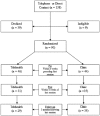Videoconferencing for Teens With Diabetes: Family Matters
- PMID: 27075708
- PMCID: PMC4928237
- DOI: 10.1177/1932296816642577
Videoconferencing for Teens With Diabetes: Family Matters
Abstract
Background: Adolescence is a developmental period associated with increased difficulty managing diabetes. During adolescence family functioning, including miscarried helping, family conflict, and acceptance of illness, is an important predictor of adherence to treatment recommendations. Multiple barriers exist to receiving behavioral health interventions to address suboptimal adherence. We hypothesized that behavioral family systems therapy-diabetes (BFST-D) delivered via telehealth would yield changes in family functioning that were not significantly different than changes in clinic-based treatment. Furthermore, that BFST-D would significantly improve overall family functioning.
Methods: Ninety adolescent participants and their parents were randomized to receive BFST-D via telehealth or traditional (Clinic) treatment conditions. Repeated measures ANOVAs were used to assess changes in mean scores across pre, post, and follow-up assessments. Mediation analyses were conducted using methods outlined by Sobel and were confirmed by bootstrapping.
Results: Changes in miscarried helping, family conflict and adjustment to illness were not significantly different across groups. Overall, clinically significant improvements were identified in youth- and parent-reported miscarried helping, family conflict, and acceptance of illness. Reductions in family conflict mediated the relationship between changes in miscarried helping and acceptance of illness. In addition, improvements in family functioning were associated with changes in adherence and glycemic control.
Conclusions: Results provide strong support for BFST-D (and similar interventions) delivered via telehealth as yielding outcomes no different than clinic-based treatment. In addition, further support was provided for the effectiveness of BFST-D.
Trial registration: ClinicalTrials.gov NCT02274103.
Keywords: adolescence; family factors; randomized clinical trial; teleconferencing; telehealth; type 1 diabetes.
© 2016 Diabetes Technology Society.
Conflict of interest statement
Figures





References
-
- Cohen DM, Lumley MA, Naar-King S, Partridge T, Cakan N. Child behavior problems and family functioning as predictors of adherence and glycemic control in economically disadvantaged children with type 1 diabetes: a prospective study. J Pediatr Psychol. 2004;29(3):171-184. - PubMed
-
- Ellis DA, Naar-King S, Frey M, Rowland M, Greger N. Case study: feasibility of multisystemic therapy as a treatment for urban adolescents with poorly controlled type 1 diabetes. J Pediatr Psychol. 2003;28(4):287-293. - PubMed
-
- Weissberg-Benchell J, Glasgow AM, Tynan WD, Wirtz P, Turek J, Ward J. Adolescent diabetes management and mismanagement. Diabetes Care. 1995;18(1):77-82. - PubMed
-
- Diabetes Control and Complications Trial Research Group. Effects of intensive diabetes treatment on the development and progression of long-term complications in adolescents with insulin-dependent diabetes mellitus: diabetes control and complications trial. N Engl J Med. 1994;125(2):177-188. - PubMed
Publication types
MeSH terms
Associated data
LinkOut - more resources
Full Text Sources
Other Literature Sources
Medical

